We’ve already checked out the hardware of the Maxtang T0-FP750 mini PC with an unboxing and a teardown in the first part of the review, before thoroughly testing the AMD Ryzen 7 8845HS mini PC in Windows 11 Pro. The time has now come to report our experience with Ubuntu 24.04, and more exactly Ubuntu 24.04.1 “dot” release, with the Maxtang T0-FT750 mini PC in the final part of the review.
This will include a software overview, feature tests, benchmarks, storage and USB performance evaluation, 2.5Gbps Ethernet and WiFi 6 network performance tests, a stress test to check for thermal and/or power throttling, and fan noise and power consumption measurements. We will also compare the results of the Maxtang T0-FP750 mini PC in Ubuntu 24.04 against the ones for the earlier Maxtang MTN-FP750 mini PC using AMD Ryzen 7 7735HS CPU which we tested with Ubuntu 22.04.
Ubuntu 24.04 system information
We installed Ubuntu 24.04 alongside Windows 11 Pro without any issues. Going to the Settings->About menu in Ubuntu 24.04.1 LTS confirms we have a “Maxtang FP750” computer powered by a 16-thread AMD Ryzen 7 8845HS CPU with Radeon 780M Graphics and equipped with 32GB memory and 512.1 GB storage.
We can get a few more details in the terminal…
|
1 2 3 4 5 6 7 8 9 10 11 12 13 14 15 16 17 18 19 20 |
aey@TO-FP750-CNX:~$ cat /etc/lsb-release DISTRIB_ID=Ubuntu DISTRIB_RELEASE=24.04 DISTRIB_CODENAME=noble DISTRIB_DESCRIPTION="Ubuntu 24.04.1 LTS" aey@TO-FP750-CNX:~$ uname -a Linux TO-FP750-CNX 6.8.0-41-generic #41-Ubuntu SMP PREEMPT_DYNAMIC Fri Aug 2 20:41:06 UTC 2024 x86_64 x86_64 x86_64 GNU/Linux aey@TO-FP750-CNX:~$ free -mh total used free shared buff/cache available Mem: 27Gi 4.1Gi 20Gi 174Mi 3.0Gi 23Gi Swap: 8.0Gi 0B 8.0Gi aey@TO-FP750-CNX:~$ df -mh Filesystem Size Used Avail Use% Mounted on tmpfs 2.8G 2.5M 2.8G 1% /run /dev/nvme0n1p5 233G 15G 207G 7% / tmpfs 14G 78M 14G 1% /dev/shm tmpfs 5.0M 16K 5.0M 1% /run/lock efivarfs 128K 24K 100K 20% /sys/firmware/efi/efivars /dev/nvme0n1p1 96M 33M 64M 34% /boot/efi tmpfs 2.8G 2.6M 2.8G 1% /run/user/1000 |
… and even more with inxi utility:
|
1 2 3 4 5 6 7 8 9 10 11 12 13 14 15 16 17 18 19 20 21 22 23 24 25 26 27 28 29 30 31 32 33 34 35 36 37 38 39 40 41 42 43 44 45 46 47 48 49 50 51 52 |
aey@TO-FP750-CNX:~$ inxi -Fc0 System: Host: TO-FP750-CNX Kernel: 6.8.0-41-generic arch: x86_64 bits: 64 Desktop: GNOME v: 46.0 Distro: Ubuntu 24.04.1 LTS (Noble Numbat) Machine: Type: Mini-pc Mobo: Maxtang model: FP750 serial: <superuser required> UEFI: American Megatrends LLC. v: FP750D805 date: 06/28/2024 CPU: Info: 8-core model: AMD Ryzen 7 8845HS w/ Radeon 780M Graphics bits: 64 type: MT MCP cache: L2: 8 MiB Speed (MHz): avg: 524 min/max: 400/5256:5100:5411:6039:5883:5727:5567 cores: 1: 400 2: 400 3: 400 4: 400 5: 400 6: 1397 7: 400 8: 400 9: 1397 10: 400 11: 400 12: 400 13: 400 14: 400 15: 400 16: 400 Graphics: Device-1: AMD Phoenix3 driver: amdgpu v: kernel Display: wayland server: X.Org v: 23.2.6 with: Xwayland v: 23.2.6 compositor: gnome-shell driver: dri: radeonsi gpu: amdgpu resolution: 1: 1920x1080~60Hz 2: 1920x1080~60Hz API: EGL v: 1.5 drivers: radeonsi,swrast platforms: wayland,x11,surfaceless,device API: OpenGL v: 4.6 compat-v: 4.5 vendor: amd mesa v: 24.0.9-0ubuntu0.1 renderer: AMD Radeon Graphics (radeonsi gfx1103_r1 LLVM 17.0.6 DRM 3.57 6.8.0-41-generic) Audio: Device-1: AMD Rembrandt Radeon High Definition Audio driver: snd_hda_intel Device-2: AMD ACP/ACP3X/ACP6x Audio Coprocessor driver: snd_pci_ps Device-3: AMD Family 17h/19h HD Audio driver: snd_hda_intel API: ALSA v: k6.8.0-41-generic status: kernel-api Server-1: PipeWire v: 1.0.5 status: active Network: Device-1: Intel Wi-Fi 6 AX200 driver: iwlwifi IF: wlp2s0 state: up mac: e8:c8:29:ed:b0:16 Device-2: Intel Ethernet I226-V driver: igc IF: enp3s0 state: down mac: b0:41:6f:12:37:26 Bluetooth: Device-1: Intel AX200 Bluetooth driver: btusb type: USB Report: hciconfig ID: hci0 state: up address: E8:C8:29:ED:B0:1A bt-v: 5.2 Drives: Local Storage: total: 476.94 GiB used: 14.54 GiB (3.0%) ID-1: /dev/nvme0n1 vendor: Kingston model: OM8PGP4512Q-A0 size: 476.94 GiB Partition: ID-1: / size: 232.52 GiB used: 14.5 GiB (6.2%) fs: ext4 dev: /dev/nvme0n1p5 ID-2: /boot/efi size: 96 MiB used: 32.5 MiB (33.9%) fs: vfat dev: /dev/nvme0n1p1 Swap: ID-1: swap-1 type: file size: 8 GiB used: 0 KiB (0.0%) file: /swap.img Sensors: System Temperatures: cpu: 43.1 C mobo: N/A gpu: amdgpu temp: 39.0 C Fan Speeds (rpm): N/A Info: Memory: total: 28 GiB available: 27.27 GiB used: 4.16 GiB (15.3%) Processes: 404 Uptime: 1h 6m Shell: Bash inxi: 3.3.34 |
Everything seems to be enumerated properly and inxi shows an AMD Ryzen 7 8845HS 8-core/16-thread CPU clocked at up to 6,039 MHz, 2.5Gbps Ethernet using Intel Ethernet I226-V, WiFi 6 using Intel Wi-Fi 6 AX200 module, and the 512GB Kingston OM8PGP4512Q-A0 NVMe SSD. The CPU temperature is reported to be 43.1°C at idle.
Maxtang T0-FP750 benchmarks on Ubuntu 24.04
Let’s start benchmarking the T0-FP750 mini PC in Linux with Thomas Kaiser’s sbc-bench.sh script:
|
1 2 3 4 5 6 7 8 9 10 11 12 13 14 15 16 17 18 19 20 21 22 23 24 25 26 27 28 29 30 31 32 33 34 35 36 37 38 39 40 41 42 43 44 45 46 47 48 49 50 51 52 53 54 55 56 57 58 59 60 61 62 63 64 65 66 67 68 69 70 71 72 73 74 75 76 77 78 79 80 81 82 83 84 85 86 87 88 89 90 91 92 93 94 95 96 97 98 99 100 101 102 103 104 105 106 107 108 109 110 111 112 113 114 115 116 117 118 119 120 121 122 123 124 125 126 127 128 129 130 131 |
aey@TO-FP750-CNX:~/Downloads/sbc-bench-master$ sudo ./sbc-bench.sh -r [sudo] password for aey: Starting to examine hardware/software for review purposes... sbc-bench v0.9.68 Installing needed tools: distro packages already installed. Done. Checking cpufreq OPP. Done. Executing tinymembench. Done. Executing RAM latency tester. Done. Executing OpenSSL benchmark. Done. Executing 7-zip benchmark. Done. Throttling test: heating up the device, 5 more minutes to wait. Done. Checking cpufreq OPP again. Done (10 minutes elapsed). Results validation: * Measured clockspeed not lower than advertised max CPU clockspeed * No swapping * Background activity (%system) OK Full results uploaded to https://0x0.st/XGsQ.bin # Maxtang FP750 / Ryzen 7 8845HS w/ Radeon 780M Graphics Tested with sbc-bench v0.9.68 on Thu, 31 Oct 2024 12:08:28 +0700. Full info: [https://0x0.st/XGsQ.bin](http://0x0.st/XGsQ.bin) ### General information: Information courtesy of cpufetch: Name: AMD Ryzen 7 8845HS w/ Radeon 780M Graphics Microarchitecture: Zen 4 Technology: 4nm Max Frequency: 5.256 GHz Cores: 8 cores (16 threads) AVX: AVX,AVX2,AVX512 FMA: FMA3 L1i Size: 32KB (256KB Total) L1d Size: 32KB (256KB Total) L2 Size: 1MB (8MB Total) L3 Size: 16MB Ryzen 7 8845HS w/ Radeon 780M Graphics, Kernel: x86_64, Userland: amd64 CPU sysfs topology (clusters, cpufreq members, clockspeeds) cpufreq min max CPU cluster policy speed speed core type 0 0 0 400 5256 Zen 4 1 0 1 400 5100 Zen 4 2 0 2 400 5411 Zen 4 3 0 3 400 6039 Zen 4 4 0 4 400 5883 Zen 4 5 0 5 400 6039 Zen 4 6 0 6 400 5727 Zen 4 7 0 7 400 5567 Zen 4 8 0 8 400 5256 Zen 4 9 0 9 400 5100 Zen 4 10 0 10 400 5411 Zen 4 11 0 11 400 6039 Zen 4 12 0 12 400 5883 Zen 4 13 0 13 400 6039 Zen 4 14 0 14 400 5727 Zen 4 15 0 15 400 5567 Zen 4 27927 KB available RAM ### Policies (performance vs. idle consumption): Status of performance related policies found below /sys: /sys/module/pcie_aspm/parameters/policy: default [performance] powersave powersupersave ### Clockspeeds (idle vs. heated up): Before at 48.9°C: cpu0: OPP: 5256, Measured: 5055 (-3.8%) After at 81.5°C: cpu0: OPP: 5256, Measured: 5006 (-4.8%) ### Performance baseline * memcpy: 19338.2 MB/s, memchr: 78171.3 MB/s, memset: 62160.5 MB/s * 16M latency: 29.35 24.55 29.59 20.34 28.37 30.20 35.97 42.13 * 128M latency: 99.30 100.2 99.31 99.85 99.19 99.60 105.4 109.2 * 7-zip MIPS (3 consecutive runs): 65834, 66532, 66576 (66310 avg), single-threaded: 6437 * `aes-256-cbc 1177961.81k 1342204.93k 1389236.39k 1406477.99k 1417893.21k 1418253.65k` * `aes-256-cbc 1187607.14k 1353090.41k 1397877.16k 1409296.04k 1413062.66k 1413267.46k` ### PCIe and storage devices: * Intel Wi-Fi 6 AX200: Speed 5GT/s, Width x1, driver in use: iwlwifi, ASPM Disabled * Intel Ethernet I226-V: Speed 5GT/s, Width x1, driver in use: igc, ASPM Disabled * AMD Phoenix3: Speed 16GT/s, Width x16, driver in use: amdgpu, ASPM Disabled * AMD Device 15b9: Speed 16GT/s, Width x16, driver in use: xhci_hcd, ASPM Disabled * AMD Device 15ba: Speed 16GT/s, Width x16, driver in use: xhci_hcd, ASPM Disabled * AMD ACP/ACP3X/ACP6x Audio Coprocessor: Speed 16GT/s, Width x16, driver in use: snd_pci_ps, ASPM Disabled * AMD Device 15c0: Speed 16GT/s, Width x16, driver in use: xhci_hcd, ASPM Disabled * AMD Device 15c1: Speed 16GT/s, Width x16, driver in use: xhci_hcd, ASPM Disabled * AMD Pink Sardine USB4/Thunderbolt NHI controller #1: Speed 16GT/s, Width x16, driver in use: thunderbolt, ASPM Disabled * AMD Pink Sardine USB4/Thunderbolt NHI controller #2: Speed 16GT/s, Width x16, driver in use: thunderbolt, ASPM Disabled * 476.9GB "KINGSTON OM8PGP4512Q-A0" SSD as /dev/nvme0: Speed 16GT/s, Width x4, 0% worn out, 302 error log entries, drive temp: 55°C, ASPM Disabled "nvme error-log /dev/nvme0 ; smartctl -x /dev/nvme0" could be used to get further information about the reported issues. ### Challenging filesystems: The following partitions are NTFS: nvme0n1p3,nvme0n1p4 -> https://tinyurl.com/mv7wvzct ### Swap configuration: * /swap.img on /dev/nvme0n1p5: 8.0G (0K used) ### Software versions: * Ubuntu 24.04.1 LTS (noble) * Compiler: /usr/bin/gcc (Ubuntu 13.2.0-23ubuntu4) 13.2.0 / x86_64-linux-gnu * OpenSSL 3.0.13, built on 30 Jan 2024 (Library: OpenSSL 3.0.13 30 Jan 2024) ### Kernel info: * `/proc/cmdline: BOOT_IMAGE=/boot/vmlinuz-6.8.0-48-generic root=UUID=726289a9-41fe-41bc-bffb-82bee89d68f2 ro quiet splash vt.handoff=7` * Vulnerability Spec rstack overflow: Mitigation; Safe RET * Vulnerability Spec store bypass: Mitigation; Speculative Store Bypass disabled via prctl * Vulnerability Spectre v1: Mitigation; usercopy/swapgs barriers and __user pointer sanitization * Kernel 6.8.0-48-generic / CONFIG_HZ=1000 Waiting for the device to cool down...................................... 47.6°C |
The cooling solution looks to work just fine with the 7-zip multi-threaded benchmarks being constant between runs at 65,834 MIPS the first time, 66,532 MIPS the second time, and 66,576 MIPS for the final runs with an average of 66,310 MIPS. After looking at the full results log, we can find out the maximum temperature was 81.6°C in a room with an ambient temperature of around 28°C.
Let’s check the power usage limit levels with ryzenadj utility:
|
1 2 3 4 5 6 7 8 9 10 11 12 13 14 15 16 17 18 19 20 21 22 23 24 25 26 27 28 29 30 31 32 33 |
aey@TO-FP750-CNX:~/RyzenAdj/build$ sudo ./ryzenadj -i CPU Family: Hawk Point SMU BIOS Interface Version: 14 Version: v0.16.0 PM Table Version: 4c0008 | Name | Value | Parameter | |---------------------|-----------|--------------------| | STAPM LIMIT | 45.000 | stapm-limit | | STAPM VALUE | 4.770 | | | PPT LIMIT FAST | 45.000 | fast-limit | | PPT VALUE FAST | 7.122 | | | PPT LIMIT SLOW | 45.000 | slow-limit | | PPT VALUE SLOW | 3.155 | | | StapmTimeConst | 85.260 | stapm-time | | SlowPPTTimeConst | 95.464 | slow-time | | PPT LIMIT APU | 45.000 | apu-slow-limit | | PPT VALUE APU | nan | | | TDC LIMIT VDD | 70.000 | vrm-current | | TDC VALUE VDD | 1.906 | | | TDC LIMIT SOC | 18.000 | vrmsoc-current | | TDC VALUE SOC | 1.600 | | | EDC LIMIT VDD | 140.000 | vrmmax-current | | EDC VALUE VDD | 111.395 | | | EDC LIMIT SOC | 26.000 | vrmsocmax-current | | EDC VALUE SOC | 3.304 | | | THM LIMIT CORE | 92.001 | tctl-temp | | THM VALUE CORE | 41.404 | | | STT LIMIT APU | 0.000 | apu-skin-temp | | STT VALUE APU | 0.000 | | | STT LIMIT dGPU | 0.000 | dgpu-skin-temp | | STT VALUE dGPU | 0.000 | | | CCLK Boost SETPOINT | nan | power-saving / | | CCLK BUSY VALUE | nan | max-performance | |
The power limits are set as follows for the T0-FP750:
- Sustained Power Limit (STAPM LIMIT) – 45 Watts
- Actual Power Limit (PPT LIMIT FAST) – 45 Watts
- Average Power Limit (PPT LIMIT SLOW) – 45 Watts
It’s odd that all limits are set to the same values, but that’s the same configuration as in Windows 11.
Let’s carry with benchmarks using Geekbench-6.3.0 to evaluate the single-core and multi-core performance of the AMD Ryzen 7 8845HS processor.
The Maxtang T0-FP750 mini PC achieved 2,640 points in the single-core benchmark, and 12,429 points in the multi-core one.
We’ll start testing the GPU on Ubuntu with Unigine Heaven Benchmark 4.0.
The system could render the scene at 84.7 FPS on average with a score of 2134 points using a standard 1920×1080 resolution.
Time for some YouTube 4K and 8K video streaming in Firefox.
4K 30FPS was smooth for over 6 minutes with only 3 frames dropped out of 11,158.
4K 60 FPS was great too, and we played the video for a little over 5 minutes with just 84 frames dropped out of 18,191.
No problem at all at 8K 30 FPS with 6 frames dropped out of 8,852.
There was some stuttering at 8K 60 FPS and “Stats for Nerds” reported 457 frames dropped out of 18,265.
Let’s repeat the same tests but in Chrome.
No frames dropped at all at 4K 30FPS.
4Kp60 is fine too with only a few frames dropped.
Same thing for 8Kp30.
8Kp60 has a similar percentage of frames dropped as in Firefox (543 out of 19,083), but video playback felt smoother in Chrome.
We then tested web browsing performance with Speedometer 2.0 in Firefox where the system achieves 314 runs per minute.
Since Speedometer 2.0 is phased out, we also ran Speedometer 3.0 to have comparison data for future reviews.
In this new (and completely different) benchmark, the mini PC achieved 21.1 points.
Maxtang T0-FP750 Ubuntu 24.04 benchmarks comparison against other mini PCs
To get a better understanding of the relative performance of the T0-FP750, we’ll compare the Ubuntu 24.04 benchmark results against other mid-range and high-end mini PCs, namely the Maxtang MTN-FP750 (AMD Ryzen 7 7735HS), the GEEKOM A5 (AMD Ryzen 7 5800H), Khadas Mind Premium (Intel Core i7-1360P), and GEEKOM A8 (AMD Ryzen 9 8945HS).
But before that, here’s a summary of the key specifications of the five systems.
| Maxtang T0-FP750 | Maxtang MTN-FP750 | GEEKOM A5 | Khadas Mind Premium | GEEKOM A8 | |
|---|---|---|---|---|---|
| SoC | AMD Ryzen 7 8845HS | AMD Ryzen 7 7735HS | AMD Ryzen 7 5800H | Intel Core i7-1360P | AMD Ryzen 9 8945HS |
| CPU | 8 cores,16 threads up to 5.1 GHz | 8 cores, 16 threads up to 4.75 GHz | 8 cores, 16 threads up to 4.4 GHz | 12 cores, 16 cores up to 5.0 GHz | 8 cores, 16 threads up to 5.2 GHz |
| GPU | AMD Radeon 780M Graphics | AMD Radeon 680M Graphics | AMD Radeon Vega 8 Graphics | 96 EU Intel Iris Xe Graphics | AMD Radeon 780M Graphics |
| Memory | 32GB DDR5-5600 | 32GB DDR5-4800 | 32GB DDR4-3200 | 32GB DDR5-5200 | 32GB DDR5-5600 |
| Storage | 512GB NVMe SSD | 512GB NVMe SSD | 512GB NVMe SSD | 1TB NVMe SSD | 2TB NVMe SSD |
| Default OS | Windows 11 Pro | Windows 11 Pro | Windows 11 Pro | Windows 11 Home | Windows 11 Pro |
And now for the benchmark results…
| Maxtang T0-FP750 | Maxtang MTN-FP750 | GEEKOM A5 | Khadas Mind Premium | GEEKOM A8 | |
|---|---|---|---|---|---|
| sbc-bench.sh | |||||
| - memcpy | 19,338.2 MB/s | 19,252.7 MB/s | 18,717.0 MB/s | 25,389.5 MB/s (P-core) | 20,318.5 |
| - memset | 62,160.5 MB/s | 18,055.7 MB/s | 43,837.0 MB/s | 24,731.8MB/s (P-core) | 62,156.7 |
| - 7-zip (average) | 66,310 | 54,740 | 53,610 | 44,430 | 68,790 |
| - 7-zip (top result) | 66,576 | 55,305 | 54,850 | 50,396 | 69,297 |
| - OpenSSL AES-256 16K | 1,413,267.46k | 1,297,694.72k | 1,202,869.59k | 1,771,334.31k (P-Core) | 1,422,136.66k |
| Geekbench 6 Single | 2,640 | 2,131 | 2,002 | 2,093 | 2,661 |
| Geekbench 6 Multi | 12,426 | 9,665 | 9,347 | 8,891 | 13,275 |
| Unigine Heaven score | 2,134 | 1,707 | 890 | 1,349 | 1,972 |
| Speedometer 2.0 (Firefox) | 314 | 247 | 218 | 242 | 298 |
The conclusion will be similar to the one in Windows 11, since the Maxtang T0-FP750 (AMD Ryzen 7 8845HS) mini PC performance is very close to the GEEKOM A8 mini PC powered by a Ryzen 9 8945HS mini PC, even though it is still ahead in most tests. Graphics performance is even better in 3DMark Strike 3D graphics benchmark and Speedometer 2.0. However, readers should bear in mind that web browser performance tends to increase over time due to software optimizations in web browsers, so that could explain the latter. Overall, the Maxtang T0-FP750 is quite faster in Ubuntu than mini PCs based on earlier generation Ryzen 7 and Core i7 processors in virtually all aspects.
SSD storage performance and USB ports testing
We’ve tested the 512GB NVMe SSD performance with iozone3:
|
1 2 3 4 5 6 7 8 9 10 11 |
aey@TO-FP750-CNX:~$ sudo iozone -e -I -a -s 1000M -r 4k -r 16k -r 512k -r 1024k -r 16384k -i 0 -i 1 -i 2 random random bkwd record stride kB reclen write rewrite read reread read write read rewrite read fwrite frewrite fread freread 1024000 4 221690 296718 226599 231796 68394 299115 1024000 16 681741 840047 578073 575477 190902 836325 1024000 512 3307098 3364082 2351379 2368790 1895572 3359004 1024000 1024 3375215 3387981 2915626 2940077 2630484 3356112 1024000 16384 3366534 3403465 4357167 4393004 4428280 3387311 iozone test complete. |
The utility reports an up to 4,357 MB/s sequential read speed and 3,366 MB/s sequential write speed which compare to 4,820 MB/s and 3,526 MB/s respectively using CrystalDiskMark on Windows 11. Not outstanding, but not bad numbers either.
An EXT-4 partition from ORICO M234C3-U4 “USB4” M.2 NVMe SSD enclosure was used to check the speed of each USB port along with lsusb and iozone3 command line utilities, except for the USB 2.0 port where a USB harddrive had to be used. Here’s the output from the front left USB Type-A port for reference:
|
1 2 3 4 5 6 7 8 9 10 |
aey@TO-FP750-CNX:~$ lsusb -t | grep uas |__ Port 001: Dev 002, If 0, Class=Mass Storage, Driver=uas, 10000M aey@TO-FP750-CNX:/media/aey/EXT4-REVIEW$ sudo iozone -e -I -a -s 1000M -r 16384k -i 0 -i 1 random random bkwd record stride kB reclen write rewrite read reread read write read rewrite read fwrite frewrite fread freread 1024000 16384 952151 951514 842099 842392 iozone test complete. |
… and the USB 2.0 Type-A port on the rear panel:
|
1 2 3 4 5 6 7 8 9 10 |
aey@TO-FP750-CNX:~$ lsusb -t | grep uas |__ Port 003: Dev 010, If 0, Class=Mass Storage, Driver=uas, 480M aey@TO-FP750-CNX:/media/aey/USB3_EXT4$ sudo iozone -e -I -a -s 1000M -r 16384k -i 0 -i 1 random random bkwd record stride kB reclen write rewrite read reread read write read rewrite read fwrite frewrite fread freread 1024000 16384 25966 29385 41799 32946 iozone test complete. |
Here’s a summary of results for all the USB ports on the Maxtang T0-FP750 (from left to right)
- Front panel
- USB-A #1 – USB 3.2 – 10,000 Mbps – Read speed: 842 MB/s; write speed: 952 MB/s
- USB-A #2 – USB 3.2 – 10,000 Mbps – Read speed: 848 MB/s; write speed: 949 MB/s
- USB-C – USB 3.2 – 10,000 Mbps – Read speed: 872 MB/s; write speed: 946 MB/s
- Rear panel
- USB-C – USB 3.2 – 10,000 Mbps – Read speed: 849 MB/s; write speed: 943 MB/s
- USB-A – USB 2.0 – 480 Mbps – Read speed: 41 MB/s; write speed: 25 MB/s
It looks OK, except the USB-C port on the rear panel is supposed to be a 40Gbps-capable USB4 port, and was only tested at 10 Gbps. As explained in the Windows review following feedback from Mxtang, that’s likely because USB4 does not always support the Thunderbolt 3 interface (optional feature), and it should work with a Thunderbolt 4 device. The ORICO enclosure I’m using is a Thunderbolt 3 device with a fallback to USB 3.0 when Thunderbolt is not working. This should explain the results…
We can also find two USB4/Thunderbolt controllers with lspci:
|
1 2 3 4 5 |
aey@TO-FP750-CNX:~$ lspci | grep USB4 00:03.1 PCI bridge: Advanced Micro Devices, Inc. [AMD] Family 19h USB4/Thunderbolt PCIe tunnel 00:04.1 PCI bridge: Advanced Micro Devices, Inc. [AMD] Family 19h USB4/Thunderbolt PCIe tunnel c6:00.5 USB controller: Advanced Micro Devices, Inc. [AMD] Pink Sardine USB4/Thunderbolt NHI controller #1 c6:00.6 USB controller: Advanced Micro Devices, Inc. [AMD] Pink Sardine USB4/Thunderbolt NHI controller #2 |
The lshw command provides a few more details:
|
1 2 3 4 5 6 7 8 9 10 11 12 13 14 15 16 17 18 19 20 21 22 23 24 |
*-usb:2 description: USB controller product: Pink Sardine USB4/Thunderbolt NHI controller #1 vendor: Advanced Micro Devices, Inc. [AMD] physical id: 0.5 bus info: pci@0000:c6:00.5 version: 00 width: 64 bits clock: 33MHz capabilities: pm pciexpress msi msix usb4_host_interface bus_master cap_list configuration: driver=thunderbolt latency=0 resources: irq:50 memory:dc880000-dc8fffff *-usb:3 description: USB controller product: Pink Sardine USB4/Thunderbolt NHI controller #2 vendor: Advanced Micro Devices, Inc. [AMD] physical id: 0.6 bus info: pci@0000:c6:00.6 version: 00 width: 64 bits clock: 33MHz capabilities: pm pciexpress msi msix usb4_host_interface bus_master cap_list configuration: driver=thunderbolt latency=0 resources: irq:78 memory:dc800000-dc87ffff |
So the Maxtang T0-FP750 does support USB4/Thunderbolt, but it’s only compatible with USB4/Thunderbolt 4, and not Thunderbolt 3. That’s the first mini PC with a USB4 port where I encountered this behavior. It also means that a person with an “old” PC with a USB4/Thunderbolt port and a Thunderbolt 3 device working fine at 40 Gbps may have its device connected at 10 Gbps or not at all on a brand new PC with a USB4 port… That’s a flaw in my book, but the company told us that was within the specifications, so there was no issue…
Network (2.5GbE and WiFi 6) performance
We’ll now test networking performance with iperf3 utility using AAEON UP Xtreme i11 mini PC on the other side. Let’s start with the 2.5GbE port of the T0-FP750 mini PC:
- Download
|
1 2 3 4 5 6 7 8 9 10 11 12 13 14 15 16 17 |
aey@TO-FP750-CNX:~$ iperf3 -t 60 -c 192.168.31.12 -i 10 -R Connecting to host 192.168.31.12, port 5201 Reverse mode, remote host 192.168.31.12 is sending [ 5] local 192.168.31.216 port 50506 connected to 192.168.31.12 port 5201 [ ID] Interval Transfer Bitrate [ 5] 0.00-10.01 sec 2.74 GBytes 2.35 Gbits/sec [ 5] 10.01-20.01 sec 2.74 GBytes 2.35 Gbits/sec [ 5] 20.01-30.01 sec 2.74 GBytes 2.35 Gbits/sec [ 5] 30.01-40.01 sec 2.74 GBytes 2.35 Gbits/sec [ 5] 40.01-50.01 sec 2.74 GBytes 2.35 Gbits/sec [ 5] 50.01-60.01 sec 2.74 GBytes 2.35 Gbits/sec - - - - - - - - - - - - - - - - - - - - - - - - - [ ID] Interval Transfer Bitrate Retr [ 5] 0.00-60.05 sec 16.4 GBytes 2.35 Gbits/sec 0 sender [ 5] 0.00-60.01 sec 16.4 GBytes 2.35 Gbits/sec receiver iperf Done |
- Upload
|
1 2 3 4 5 6 7 8 9 10 11 12 13 14 15 16 |
aey@TO-FP750-CNX:~$ iperf3 -t 60 -c 192.168.31.12 -i 10 Connecting to host 192.168.31.12, port 5201 [ 5] local 192.168.31.216 port 58802 connected to 192.168.31.12 port 5201 [ ID] Interval Transfer Bitrate Retr Cwnd [ 5] 0.00-10.00 sec 2.74 GBytes 2.35 Gbits/sec 0 762 KBytes [ 5] 10.00-20.01 sec 2.74 GBytes 2.35 Gbits/sec 0 1.12 MBytes [ 5] 20.01-30.01 sec 2.74 GBytes 2.35 Gbits/sec 0 1.12 MBytes [ 5] 30.01-40.00 sec 2.74 GBytes 2.35 Gbits/sec 0 1.12 MBytes [ 5] 40.00-50.00 sec 2.74 GBytes 2.35 Gbits/sec 0 1.12 MBytes [ 5] 50.00-60.01 sec 2.74 GBytes 2.35 Gbits/sec 0 1.67 MBytes - - - - - - - - - - - - - - - - - - - - - - - - - [ ID] Interval Transfer Bitrate Retr [ 5] 0.00-60.01 sec 16.4 GBytes 2.35 Gbits/sec 0 sender [ 5] 0.00-60.06 sec 16.4 GBytes 2.35 Gbits/sec receiver iperf Done. |
- Full duplex (bidirectional)
|
1 2 3 4 5 6 7 8 9 10 11 12 13 14 15 16 17 18 19 20 21 22 23 24 25 |
aey@TO-FP750-CNX:~$ iperf3 -t 60 -c 192.168.31.12 -i 10 --bidir Connecting to host 192.168.31.12, port 5201 [ 5] local 192.168.31.216 port 50136 connected to 192.168.31.12 port 5201 [ 7] local 192.168.31.216 port 50146 connected to 192.168.31.12 port 5201 [ ID][Role] Interval Transfer Bitrate Retr Cwnd [ 5][TX-C] 0.00-10.01 sec 2.74 GBytes 2.35 Gbits/sec 0 766 KBytes [ 7][RX-C] 0.00-10.01 sec 2.74 GBytes 2.35 Gbits/sec [ 5][TX-C] 10.01-20.01 sec 2.73 GBytes 2.35 Gbits/sec 0 766 KBytes [ 7][RX-C] 10.01-20.01 sec 2.73 GBytes 2.35 Gbits/sec [ 5][TX-C] 20.01-30.01 sec 2.73 GBytes 2.35 Gbits/sec 0 1.10 MBytes [ 7][RX-C] 20.01-30.01 sec 2.73 GBytes 2.35 Gbits/sec [ 5][TX-C] 30.01-40.01 sec 2.73 GBytes 2.35 Gbits/sec 209 908 KBytes [ 7][RX-C] 30.01-40.01 sec 2.73 GBytes 2.35 Gbits/sec [ 5][TX-C] 40.01-50.01 sec 2.74 GBytes 2.35 Gbits/sec 0 1.19 MBytes [ 7][RX-C] 40.01-50.01 sec 2.73 GBytes 2.35 Gbits/sec [ 5][TX-C] 50.01-60.01 sec 2.73 GBytes 2.35 Gbits/sec 0 1.19 MBytes [ 7][RX-C] 50.01-60.01 sec 2.73 GBytes 2.35 Gbits/sec - - - - - - - - - - - - - - - - - - - - - - - - - [ ID][Role] Interval Transfer Bitrate Retr [ 5][TX-C] 0.00-60.01 sec 16.4 GBytes 2.35 Gbits/sec 209 sender [ 5][TX-C] 0.00-60.05 sec 16.4 GBytes 2.35 Gbits/sec receiver [ 7][RX-C] 0.00-60.01 sec 16.4 GBytes 2.35 Gbits/sec 1 sender [ 7][RX-C] 0.00-60.05 sec 16.4 GBytes 2.35 Gbits/sec receiver iperf Done. |
Perfect! No issues at all.
Let’s now switch to 5GHz WiFi 6 adding a Xiaomi Mi AX6000 router into the mix.
- Download
|
1 2 3 4 5 6 7 8 9 10 11 12 13 14 15 16 17 |
aey@TO-FP750-CNX:~$ iperf3 -t 60 -c 192.168.31.12 -i 10 -R Connecting to host 192.168.31.12, port 5201 Reverse mode, remote host 192.168.31.12 is sending [ 5] local 192.168.31.212 port 45742 connected to 192.168.31.12 port 5201 [ ID] Interval Transfer Bitrate [ 5] 0.00-10.01 sec 1.78 GBytes 1.53 Gbits/sec [ 5] 10.01-20.01 sec 1.82 GBytes 1.56 Gbits/sec [ 5] 20.01-30.01 sec 1.79 GBytes 1.54 Gbits/sec [ 5] 30.01-40.01 sec 1.78 GBytes 1.53 Gbits/sec [ 5] 40.01-50.01 sec 1.81 GBytes 1.55 Gbits/sec [ 5] 50.01-60.01 sec 1.77 GBytes 1.52 Gbits/sec - - - - - - - - - - - - - - - - - - - - - - - - - [ ID] Interval Transfer Bitrate Retr [ 5] 0.00-60.05 sec 10.7 GBytes 1.54 Gbits/sec 0 sender [ 5] 0.00-60.01 sec 10.7 GBytes 1.54 Gbits/sec receiver iperf Done. |
- Upload
|
1 2 3 4 5 6 7 8 9 10 11 12 13 14 15 16 |
aey@TO-FP750-CNX:~$ iperf3 -t 60 -c 192.168.31.12 -i 10 Connecting to host 192.168.31.12, port 5201 [ 5] local 192.168.31.212 port 34346 connected to 192.168.31.12 port 5201 [ ID] Interval Transfer Bitrate Retr Cwnd [ 5] 0.00-10.01 sec 1.80 GBytes 1.54 Gbits/sec 0 3.14 MBytes [ 5] 10.01-20.01 sec 1.74 GBytes 1.49 Gbits/sec 315 3.00 MBytes [ 5] 20.01-30.01 sec 1.78 GBytes 1.53 Gbits/sec 0 3.00 MBytes [ 5] 30.01-40.01 sec 1.81 GBytes 1.56 Gbits/sec 0 3.00 MBytes [ 5] 40.01-50.01 sec 1.76 GBytes 1.52 Gbits/sec 0 3.00 MBytes [ 5] 50.01-60.01 sec 1.77 GBytes 1.52 Gbits/sec 0 3.00 MBytes - - - - - - - - - - - - - - - - - - - - - - - - - [ ID] Interval Transfer Bitrate Retr [ 5] 0.00-60.01 sec 10.7 GBytes 1.53 Gbits/sec 315 sender [ 5] 0.00-60.06 sec 10.7 GBytes 1.53 Gbits/sec receiver iperf Done. |
Excellent performance with 1.5 Gbps transfer in either direction (upload or download).
We also quickly tested Bluetooth 5.2 by transferring a screenshot to an Android smartphone. Again, no issue there.
Stress test and thermal performance
We ran a stress test on all 16 threads while monitoring CPU temperature and frequency on Ubuntu 24.04 using Psensor and the sbc-bench.sh script.
The CPU temperature stabilizes at about 87°C and the CPU frequency at around 3800 MHz. The temperature jumps rapidly as soon as we start the test as you can see from the Psensor chart above and the sbc-bench.sh -m command.
Fan noise
The T0-FP750 is a nice improvement over the Maxtang MTN-FP750 mini PC when it comes to fan noise. It’s quiet at idle and under light load, although it becomes louder under heavier loads We measured the fan noise with a sound level meter placed at around 5 centimeters from the top of the enclosure:
- Idle – 39 – 39.5 dBA
- YouTube 8Kp60 video in Chrome – 50.2 – 52.1 dBA
- Stress test on all 16 threads – 55.8 – 57.1 dBA
For reference, the meter measures around 37 – 38 dBA in a quiet room.
Maxtang T0-FP750 power consumption in Ubuntu 24.04
We measured the power consumption with a wall power meter:
- Power off – 0.9 Watt
- Idle – 7.4 – 7.8 Watts
- Video playback – 60.6 – 63.9 Watts (Youtube 8K 60fps in Firefox)
- CPU stress test (stress -c 16)
- First 30 seconds – 64.2 – 66.7 Watts
- Longer run – 66.7 – 67.2 Watts (or about the same…)
During the measurements, the mini PC was connected to WiFi 6, one RF dongle for a keyboard, one for a USB mouse, and GAOMON PD2200 pen display connected to HDMI and its own power adapter.
Conclusion
Maxtang T0-FP750 mini PC works well with Ubuntu 24.04.1 operating system with most features working as expected, and we were especially pleased with 2.5GbE and WiFi 6 networking performance. This mini PC is suitable for various uses, both office work, online learning, and even gaming. Benchmark results reveal it’s almost as performant as some Ryzen 9 systems, and we could play 4K and 8K YouTube videos smoothly in Chrome but struggled a bit more in Firefox at 8Kp60.
The main downside is that the USB4 port does not support the Thunderbolt 3 devices since it’s optional in specifications. Yet, it’s the first mini PC with a USB4 port that does not implement Thunderbolt 3 support meaning some Thunderbolt devices won’t work with the Maxtang T0-FP750, or only work at lower speeds as was the case for the ORICO SSD enclosure I’m using for testing. The fan noise improved a lot compared to the earlier MTN-FP750, but it’s still noisy under load.
We’d like to thank Maxtang for sending the T0-FP750 mini PC for review. The AMD Ryzen 7 8845HS mini PC can be ordered from the company’s online store for $629 in the reviewed configuration (32GB DDR5 and 512GB SSD), and you can enter the coupon code CNX80 to get another $80 off, bringing the price down to $549. Alternatively, it’s available on Amazon for $649 in the same configuration, as $499 as a barebone system
CNXSoft: This review is a translation – with some additional insights – of the original article on CNX Software Thailand by Suthinee Kerdkaew.

Jean-Luc started CNX Software in 2010 as a part-time endeavor, before quitting his job as a software engineering manager, and starting to write daily news, and reviews full time later in 2011.
Support CNX Software! Donate via cryptocurrencies, become a Patron on Patreon, or purchase goods on Amazon or Aliexpress


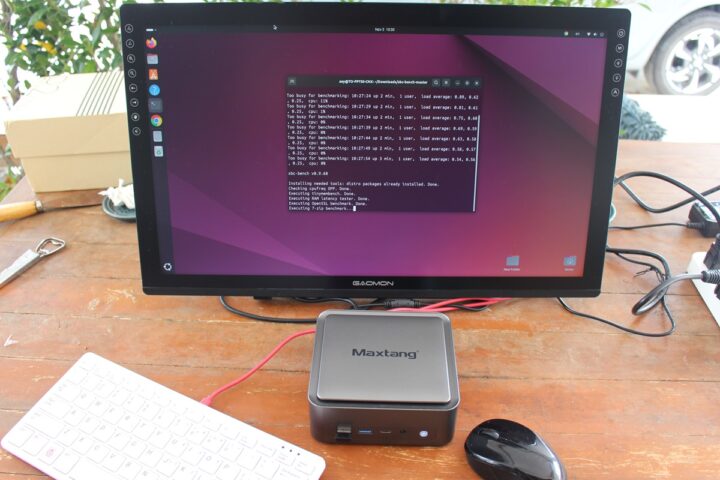
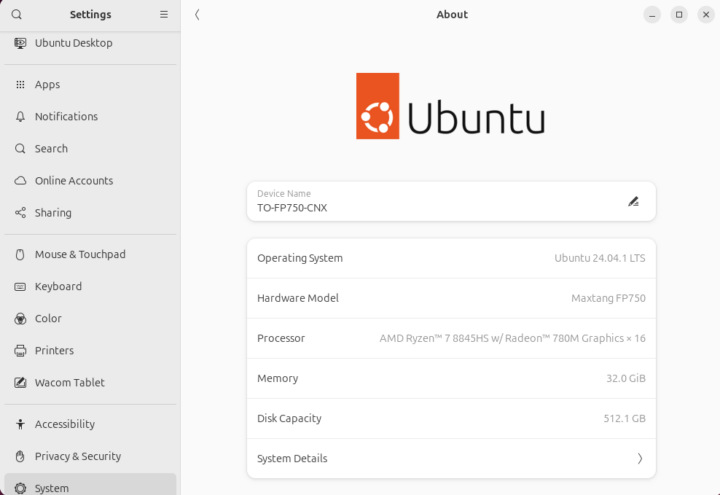
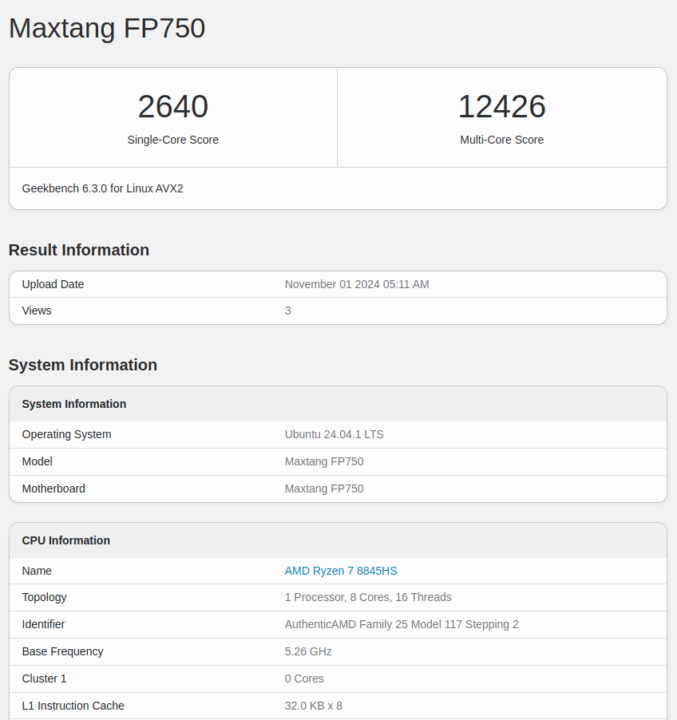
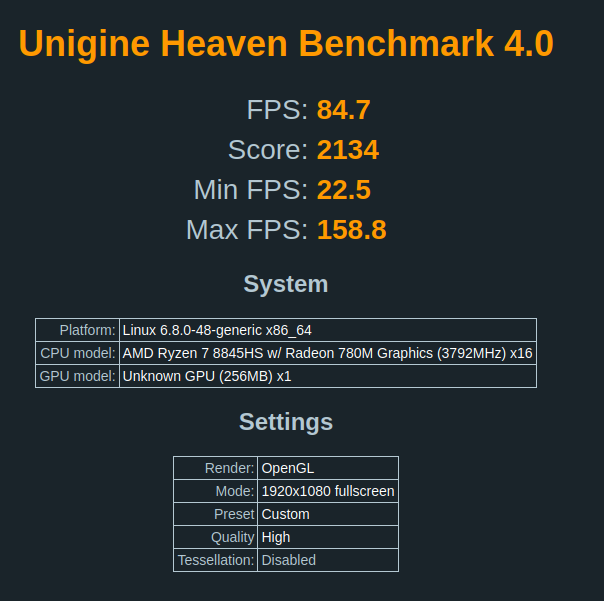


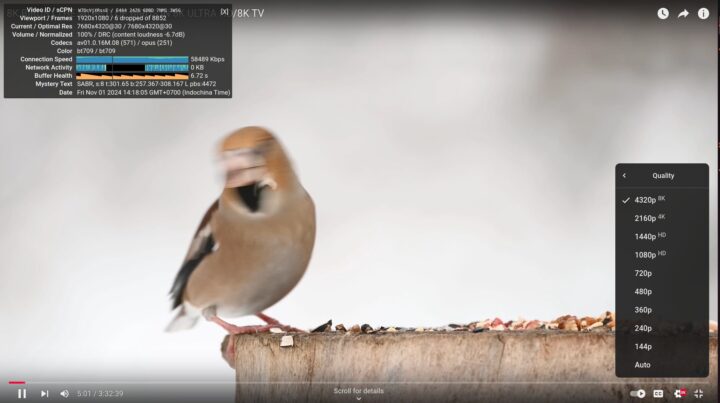
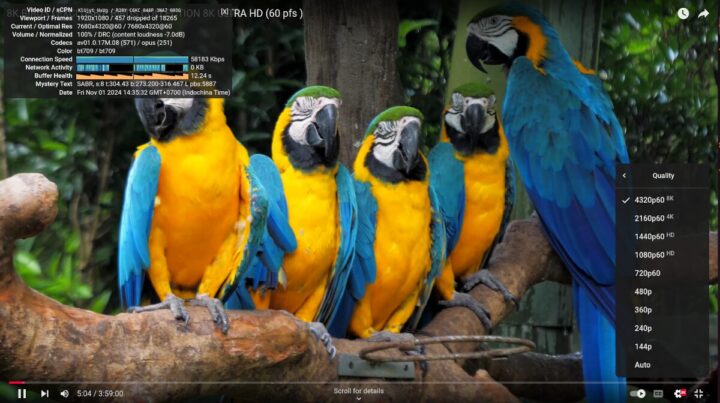
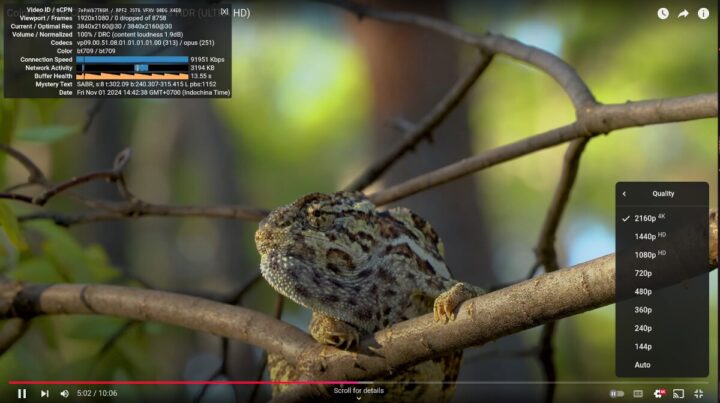

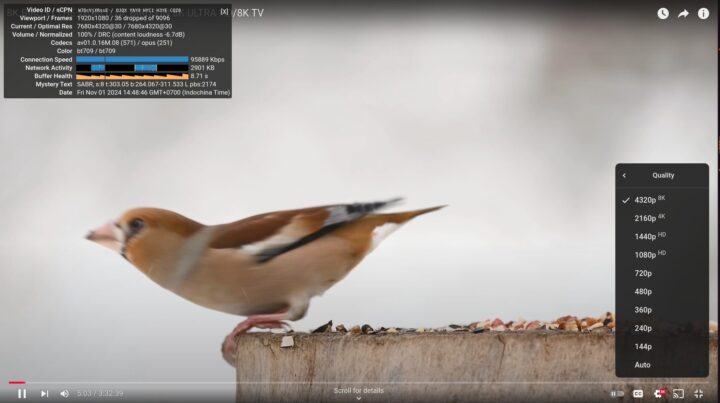
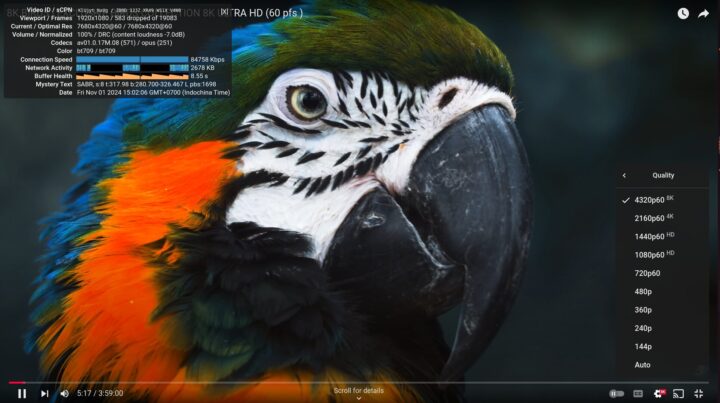
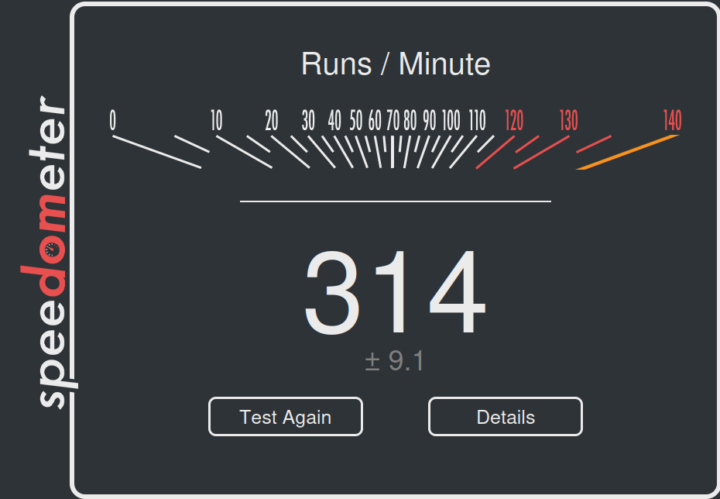

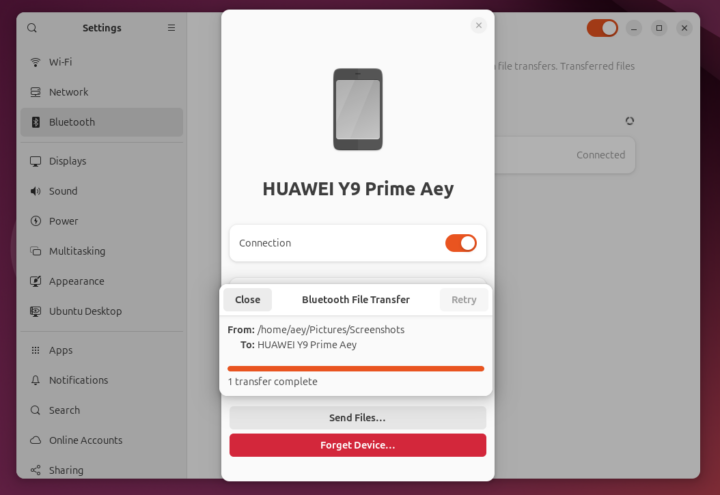

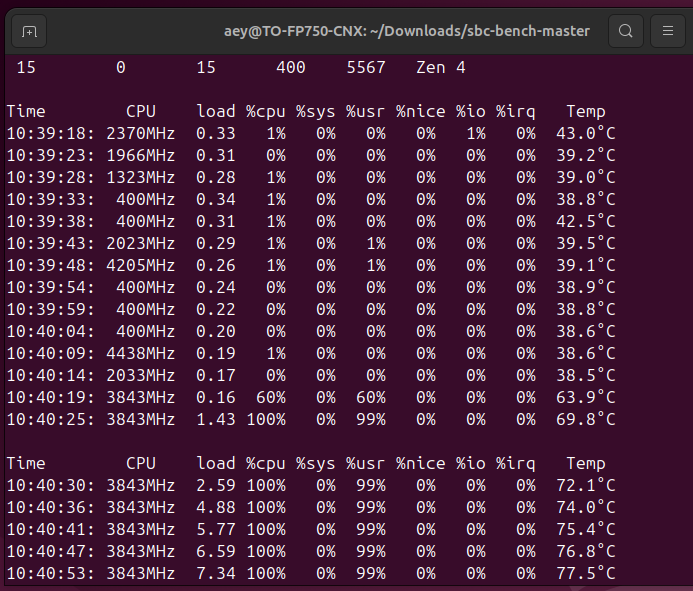



Greetings from Costa rica! Wow…Super thorough review. Thanks